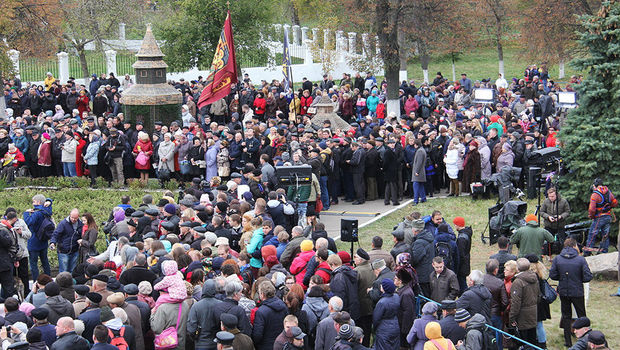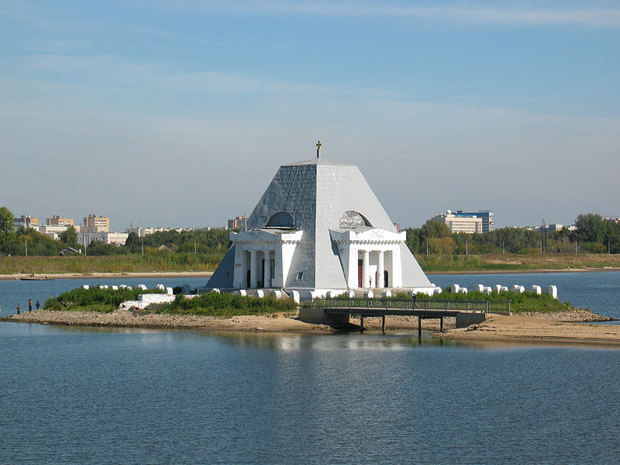Aleksander Prokhanov: ‘Now it is pointless to blame Ivan the Terrible for the siege of Kazan’
The Zavtra newspapaer editor in chief explained why the monument to Ivan the Terrible in Oryol was opened on Day of Remembrance and Grief
The opening of the monument to Ivan the Terrible in Oryol that took place on 15 October divided the intellectual elite into two camps. Realnoe Vremya talked to the present at the ceremony famous writer and politician Aleksander Prokhanov. He told why this monument is really necessary for our country, what he thinks about the heated debates on the monument installation and about the coincidence of the two dates – the monument was opened on Day of seizure of Kazan by troops of Ivan the Terrible.
'We are surrounded by NATO, and a collapse is hanging over the state'
Mr Prokhanov, could you tell us how the opening of the monument to Ivan the Terrible went? What was the atmosphere? Was there an attempt to disrupt the ceremony?
There was a festive atmosphere, almost the whole city came, there were the performances of the ensembles of folk songs, Cossack songs, many guests came. The governor gave a speech, also there were Professors of History, guests from Moscow, including Kurginyan [Sergey Kurginyan, a Russian politician person – editor's note] and me. The monument was blessed by elder Eliy — the spiritual father of the Patriarch. Through this sanctification, the sprinkling of the monument, the Orthodox Church has approved its establishment. In general, everything was very solemn and high.
There have not been any attempt to disrupt. At the TV shows, arranged by the Channel One Russia, there were invited three such 'protesters' — one from Yabloko party, the others from somewhere else, but it was absolutely intimately and it was not associated with leaflets, demonstrations — it was not.

'There was a festive atmosphere, almost the whole city came, there were the performances of the ensembles of folk songs, Cossack songs, many guests came…' Photo: Svetlana Korenkova (gazeta.ru)
Could you tell why this monument is necessary to the modern Russia, which is experiencing tough times?
For example, the monument to Chizhik-Pyzhik was installed at the Fontanka – it is a very timely, powerful monument, and next to it there is a tiny Nose monument — these monuments are symbols of our time. We have no heroes, our government is not threatened by anything, we can have fun. Chizhik-Pyzhiks, Noses, — you can install a monument to a mosquito, or the left leg of a fly…
Now it is a hard time, because the Russian state after the disaster of 1991 is being subjected to powerful pressure. It is difficult not because there are dissidents, not because there is so-called a 'fifth column' but because that from all sides we are surrounded by NATO, and a callapse is threatening the state.
Therefore, everything that has been done by the government and the people for the preservation of the state is absolutely justified. Monuments to those leaders that retained the state, expanded, strengthened and protected – it is timely and necessary.
'Who is Karamzin? Who is Solovyev? Who Klyuchevsky? They are all representatives of the ruling class of the nobility'
The monument has caused much controversy: Ivan the Terrible is called a slandered Tsar-reformer, a tyrant, a despot… What do you think about these discussions?
For me, Ivan the Terrible is the great Russian statist, who made a huge contribution to the creation of the centralized Russian state, because the history of the Russian state is a history of its centralization, the history of the defeat of enemies, opponents, and Ivan did it like no other.
There are several such figures in the history of the Rus' states or empires – Vladimir the Great, who united through arms and Orthodoxy the ancient Kievan-Novgorod Rus, Ivan the Terrible – Moscow Rus or the second empire, Peter I – the Romanovs Empire, Stalin — the Soviet, the fourth empire, well, Vladimir Vladimirovich Putin is doing it.

'For me, Ivan the Terrible is the great Russian statist, who made a huge contribution to the creation of the centralized Russian state.' Photo: zavtra.ru
Many opponents of the installation of the monument rightly noticed that there is no Ivan the Terrible on the monument to the 1000th anniversary of Russia in Veliky Novgorod…
Yes, he's not there, but we have made up for this loss by the opening this monument. Now he's here, if not on the monument to the 1000 anniversary of Russia, in Oryol, which he founded.
You see, Ivan the Terrible has two reputations — one created by the people in the epics, legends, songs — a reputation of the great figure, which is largely true. They don't call him 'Bloody'. 'Bloody' is Mary Tudor, a European ruler, or Nicholas the Bloody. Ivan the Terrible was not called 'Bloody' at his times. And one of the cities of Russia is also called Grozny (Ivan the Terrible is Ivan Grozny in Russian — editor's note), by the way. This reputation among people was positive, although not as saint as among the saints.
And there is a second reputation, which was created by the aristocracy, the nobility, then by the intelligentsia. Who is Karamzin? Who is Solovyev? Who Klyuchevsky? They are all representatives of the ruling class of the nobility, against whom at the time was raised the retributive sword of Ivan the Terrible. These two reputations live. Today it is pointless to talk about these two reputations – there is no nobility. We will have to restore the reputation, as it is useful in today's society and the state.
'The Tatars is one of the main pillars, on which the current state rests'
Is the opening of the monument on Day of Remembrance to commemorate the fall of Kazan — just a coincidence?
I can't say anything about it. Just day of the monument coincided with the Protection of Our Most Holy Lady Theotokos and Ever-Virgin Mary. Pokrov is the most important Russian Orthodox temple, and it comes as no surprise that in Moscow Saint Basil's Cathedral — one of the most beautiful churches in Russia — is an image of the Russian paradise. We talked about the fact that the opening of the monument coincided with the feast of the Intercession of the Theotokos, and the fact that Kazan was seized that day…
It was a time when the Tatars seized Moscow, Moscow fought back from the Tatars, Moscow was paying tribute to the Horde, and vice versa. Since then, everything has changed. Now it is pointless to blame Ivan the Terrible for the seige of Kazan. It was a struggle for the creation of the state. As soon as he seized Kazan, the Tatar elite was introduced into the circle close to the Tsar, the Tatar nobles were not beaten or destroyed — on the contrary, they were included in the Russian elite.
Here I do not see a national background. Although, it is possible to extract an impulse from anything, you will agree. And even from the fact that we are not speaking Tatar right now.

'Now it is pointless to blame Ivan the Terrible for teh siege of Kazan. It was a struggle for the creation of the state.' Photo: tatarstan-mitropolia.ru
In your opinion, it does not make any contention? Besides, we all know that at the heart of modern Russia there is the Golden Horde origin...
Discord, of course, was introduced by Yeltsin at a time when Tatarstan was going almost to secede from Russia and to form its own army. But those days, thank God, are over and the separatism (at least explicitly) has been overcome.
As for the Russian ideas about the Tatars today, I think it's great people, amazing people, beautiful, strong, organized, and cohesive. A state-forming people – it is not a minority (like someone could respond). If there had not been the Tatars, we would not have today's Russian state. Volga civilization is an amazing phenomenon, in which the Tartars occupy a very prominent and important part. To me and to known Russian statists, the Tatars — it is a culture, a people, is one of the main pillars, on which the current state rests.